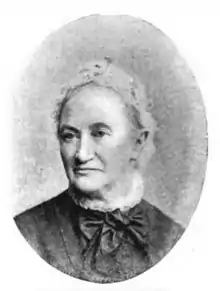Elizabeth Louisa Foster Mather
Elizabeth Louisa Foster Mather (writing as, E. Louisa Mather; January 7, 1815 – February 5, 1882) was a 19th-century American writer. She wrote essays, stories and poems for 40 years on religious subjects, capital punishment, and woman's suffrage.
Elizabeth Louisa Foster Mather | |
|---|---|
 | |
| Born | Elizabeth Louisa Foster January 7, 1815 East Haddam, Connecticut, U.S. |
| Died | February 5, 1882 (aged 67) |
| Resting place | Hungerford Cemetery, East Haddam |
| Pen name | E. Louisa Mather |
| Occupation | writer |
| Language | English |
| Nationality | American |
| Spouse | Eleazer Watrous Mather
(m. 1837) |
Early years
Elizabeth Louisa Foster was born in East Haddam, Connecticut, January 7, 1815. On her maternal side, she was a relative of Mrs. Abel C. Thomas. Mather was baptized in the Episcopal Church, of which her parents were members. Her grandfather was Joel Foster, A. M. Her father came from Massachusetts, and settled in Connecticut in 1809 or 1810. The family traces its descent from Miles Standish, of Plymouth Colony, on the father's side.[1]
Career
June 18, 1837, she married Eleazer Watrous Mather (1812–1887),[2] of East Haddam. He was a farmer.[3] In the early days of her marriage, her husband took the "Universalist Union", and the writings of Julia H. Scott arrested her attention. Mather became a convert to Universalism soon after her husband did so.[1][4]
Mather wrote essays, stories and poems for Ladies' Repository from 1847 to 1874, as well as for the Universalist Union, Trumpet, Ambassador, Golden Hide, and Odd Fellows' Offering. Mary Livermore invited Mather to write for the Lily of the Valley.[1] She wrote for 40 years,[5] on religious subjects, capital punishment, and woman's suffrage.[3]
Personal life
There were at least three children from the marriage, Kate Louise Mather Warner, Nathan Augustus Mather, and Fannie Foster Mather Dickinson. Mather endured two weeks of severe suffering[5] before she died February 5, 1882,[2][3] and was buried at the Hungerford Cemetery in East Haddam.
From Hadlyme hills, poems and prose by E. Louisa Mather (1956) is a compilation by her granddaughter, M. Catherine Dickinson Writer and her great-granddaughter, Priscilla Wright Pratt.[6]
References
- Hanson 1884, pp. 111–.
- Ransom 1903, p. 122.
- Pierce 1899, p. 322.
- "Notable Women M". UUHHS. Retrieved 18 September 2017.
- Beckwith 1880, p. 48.
- Library of Congress 1957, p. 1216.
Attribution
 This article incorporates text from a publication now in the public domain: Beckwith, George (1880). Beckwith's Almanac (Public domain ed.). Peck, White & Peck.CS1 maint: ref=harv (link)
This article incorporates text from a publication now in the public domain: Beckwith, George (1880). Beckwith's Almanac (Public domain ed.). Peck, White & Peck.CS1 maint: ref=harv (link)  This article incorporates text from a publication now in the public domain: Hanson, E. R. (1884). Our Woman Workers: Biographical Sketches of Women Eminent in the Universalist Church for Literary, Philanthropic and Christian Work (Public domain ed.). Star and Covenant Office.CS1 maint: ref=harv (link)
This article incorporates text from a publication now in the public domain: Hanson, E. R. (1884). Our Woman Workers: Biographical Sketches of Women Eminent in the Universalist Church for Literary, Philanthropic and Christian Work (Public domain ed.). Star and Covenant Office.CS1 maint: ref=harv (link)  This article incorporates text from a publication now in the public domain: Pierce, Frederick Clifton (1899). Foster genealogy. Part 1 (Public domain ed.). Press of W.B. Conkey Company.CS1 maint: ref=harv (link)
This article incorporates text from a publication now in the public domain: Pierce, Frederick Clifton (1899). Foster genealogy. Part 1 (Public domain ed.). Press of W.B. Conkey Company.CS1 maint: ref=harv (link)  This article incorporates text from a publication now in the public domain: Ransom, Wyllys Cadwell (1903). Historical Outline of the Ransom Family of America (Public domain ed.). Press of Ann Arbor plant, The Richmond & Backus Company.CS1 maint: ref=harv (link)
This article incorporates text from a publication now in the public domain: Ransom, Wyllys Cadwell (1903). Historical Outline of the Ransom Family of America (Public domain ed.). Press of Ann Arbor plant, The Richmond & Backus Company.CS1 maint: ref=harv (link)
Bibliography
- Library of Congress (1957). Catalog of Copyright Entries. Third Series: 1956. Copyright Office, Library of Congress.CS1 maint: ref=harv (link)